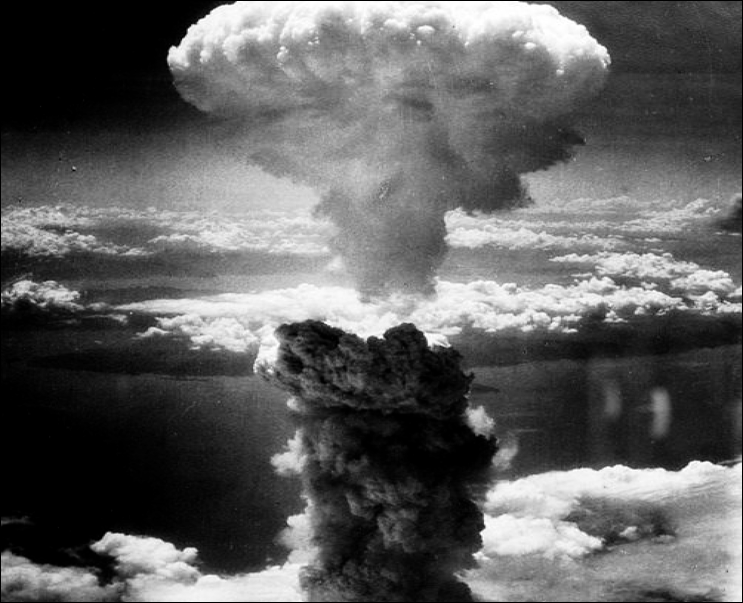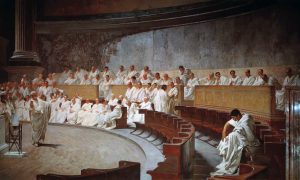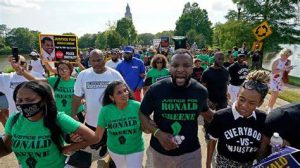Winner of the Spring 2017 StMU History Media Awards for
Best Article in the Category of “World History”
“We knew the world would not be the same. A few people laughed, a few people cried, most people were silent. I remembered the line from the Hindu scripture the Bhagavad Gita. Vishnu is trying to persuade the prince that he should do his duty and to impress him takes on his multiarmed form and says, ‘Now, I am become Death, the destroyer of worlds.’ I suppose we all thought that one way or another.”1
- J. Robert Oppenheimer, The Decision to Drop the Bomb

Throughout the history of human warfare, conflict has pushed humans to innovate–to build ever larger and deadlier weapons, each more lethal than the last. However, it was not until World War II and the invention of the atomic bomb that humanity has been able to kill on such a massive and efficient scale. Case in point, in the final days of World War II, the United States carried out one of the most chilling instances of mass murder in the history of humanity: the bombing of the Japanese cities of Hiroshima and Nagasaki. These attacks ultimately killed an estimated 294,000 people, the majority of whom were noncombatants.2 In comparison, the Japanese attack on Pearl Harbor killed just 2,408 American citizens, although this is largely due to the focused Japanese attack on military targets, namely the Pacific fleet and U.S. airfields.3 To give a more modern frame of comparison, the terrorist attacks against the World Trade Center and Pentagon, considered to be by far the worst terrorist attacks against the United States, claimed the lives of 2,974 American citizens.4
In the spring of 1945, World War II was entering its final stages. The Allies had already achieved victory in Europe with Germany’s surrender on May 7th, but the conflict on the Pacific front was still going strong. In the years leading up to the two World Wars, Japan’s victories against two larger countries–China in the Sino-Japanese War (1894–1895) and Russia in the Russo-Japanese War (1904–1905)–combined with other factors, forged a strong sense of Japanese nationalism, militarism, and cultural superiority. This fervent nationalism, integrated with the Japanese warrior ethic known as bushido, made the prospect of a Japanese surrender unlikely, even as the Allies began to position for an invasion of the Japanese mainland.5

Concurrently, since as early as 1942, President Franklin Delano Roosevelt had been secretly sponsoring and funding The Manhattan Project, the code name used for the $2 billion U.S. effort to develop a nuclear weapon before the Germans. A team of top physicists led by Dr. Julius Robert Oppenheimer were assigned to this project, a task so secret that not even individuals as important as then Vice President Harry S. Truman was aware of it. Shortly after Roosevelt’s untimely death and Truman’s subsequent inauguration to the presidency in April 1945, he was informed that the Manhattan Project was approaching success–that a nuclear weapon would be feasible in just four short months.6
Faced with the prospect of a costly and deadly invasion of Japan, Truman and his advisors were faced with a difficult choice: utilize this new atomic weapon or try to defeat Japan through conventional means. In late July, the United States issued the Postdam Declaration, a statement which gave Japan the choice between unconditional surrender or total annihilation. When this declaration went ignored, President Truman authorized the use of the atomic bomb.7

On the morning of August 6, 1945, Colonel Paul Tibbets piloted the Enola Gay over the city of Hiroshima, where his crew dropped an atomic bomb code-named “Little Boy.” Upwards of 70,000 people died instantly in the blast. Additionally, 48,000 buildings were destroyed and another 22,000 were damaged, leaving only 6,000 buildings untouched. Three days later, on August 9th, a second bomb was dropped onto Nagasaki, killing another 36,000 people. In total, an estimated 295,000 were killed in the blasts or from complications from the resulting nuclear fallout.8
Emperor Hirohito ordered the surrender of Japan on August 10, 1945. On August 15th, radios across Japan broadcasted Hirohito’s words as he read the declaration of surrender to the Japanese people, thus ending World War II. The bombs’ effectiveness in forcing the Japanese to surrender is still subject of popular debate among historians to this day, given that the Russian invasion of Japan-controlled Manchuria occurred at the same time of Nagasaki, both of which likely impacted Japan’s will to continue fighting.9 Even so, while the political and military effects of these blasts may be debated, none can contest their tragedy and devastation.

- Jason Pontin, “Oppenheimer’s Ghost,” MIT Technology Review, October 15, 2007. https://www.technologyreview.com/s/408835/oppenheimers-ghost/. ↵
- Dennis W. Cheek, “Hiroshima and Nagasaki,” in Encyclopedia of Science, Technology, and Ethics, edited by Carl Mitcham, Vol. 2, Detroit: Macmillan Reference USA, 2005. Gale Virtual Reference Library (accessed February 6, 2017), 923. ↵
- Sonia Benson, Daniel E. Brannen, Jr., and Rebecca Valentine, “Pearl Harbor Attack,” in UXL Encyclopedia of U.S. History, Vol. 6, Detroit: UXL, 2009. Gale Virtual Reference Library (accessed February 6, 2017), 1208. ↵
- Stefan M. Brooks, “September 11 Attacks,” in The Encyclopedia of Middle East Wars: The United States in the Persian Gulf, Afghanistan, and Iraq Conflicts, edited by Spencer C. Tucker, Vol. 3, Santa Barbara, CA: ABC-CLIO, 2010. Gale Virtual Reference Library (accessed February 6, 2017), 1096. ↵
- “The United States Drops the Atomic Bomb on Hiroshima and Nagasaki,” in Global Events: Milestone Events Throughout History, edited by Jennifer Stock, Vol. 2, Asia and Oceania, Farmington Hills, MI: Gale, 2014. Gale Virtual Reference Library (accessed February 5, 2017), 361. ↵
- “An Overview of the Atomic Bombings of Hiroshima and Nagasaki,” in The Atomic Bombings of Hiroshima and Nagasaki, edited by Sylvia Engdahl, Perspectives on Modern World History, Detroit: Greenhaven Press, 2011. Gale Virtual Reference Library (accessed February 6, 2017), 13-14. ↵
- “An Overview of the Atomic Bombings of Hiroshima and Nagasaki,” in The Atomic Bombings of Hiroshima and Nagasaki, edited by Sylvia Engdahl, Perspectives on Modern World History, Detroit: Greenhaven Press, 2011. Gale Virtual Reference Library (accessed February 6, 2017), 14-15. ↵
- Dennis W. Cheek, “Hiroshima and Nagasaki,” in Encyclopedia of Science, Technology, and Ethics, edited by Carl Mitcham, Vol. 2, Detroit: Macmillan Reference USA, 2005. Gale Virtual Reference Library (accessed February 6, 2017), 923. ↵
- “The United States Drops the Atomic Bomb on Hiroshima and Nagasaki,” in Global Events: Milestone Events Throughout History, edited by Jennifer Stock, Vol. 2, Asia and Oceania, Farmington Hills, MI: Gale, 2014. Gale Virtual Reference Library (accessed February 5, 2017), 361. ↵



152 comments
Christopher Morales
The atomic bomb to this date has been used as a form of deterrence from the same use of the weapon from other countries. The story you told is very interesting and an important part of history. All of human history. The bomb changed the course of the world order and the race to find this weapon shaped it. It is interesting and I learned a lot in your story that explains how we as humanity has changed based on the bombs in Japan.
Robert Miller
I have been to Nagasaki, and I have visited ground zero. I have been all over the world and the one place that sticks out the most to me is that site. The melancholy there is thick, even today. As I walked around the site as an American, mingling with the Japanese citizens, I felt almost ashamed and intimidated. I know that in the end the bombings of Hiroshima and Nagasaki possibly kept the world from complete irreversible chaos but visiting that ground zero site really put things into perspective.
Daniel Gimena
Good article about one of the most known WWII event.
When you stop anything you are doing and just think about what the bombing of Hiroshima and Nagasaki really meant, you start being aware about what we humans have done in our history; a weapon that in a matter of seconds can destroy any form of life of a big part of a country.
What I liked the most after reading the article, is trying to think how president Truman would have reacted after being informed that a nuclear weapon was being built during the last years in front of his eyes without knowing it.
it is, indeed, another example of the things we should not forget, in order to never doing them again.
Jacob Galan
This is one moment that I wish the U.S would take back although I support retaliation against them what we did was horrible, in the fact that we killed their citizens while the Japanese targeted are military. A what if comes to play since this war with Japan and the U.S. could go on forever since Japan would not go down without a fight.
Daniel Matheu Baldor
This is probably one of the most controversial episodes of the II World War.
It is always interesting to read about this topic since they made me think and question myself about morality and ethic. I liked how this article summarizes all the important information about this event in a few words. I think that nuclear bombs shouldn’t be used again since it is not only the destruction the cause at the moment, but the damage it can leave the next 50 or 100 years.
Paula Salinas Gonzalez
This was a really interesting article! I knew about the bombings before but I never knew how many innocent people died. These bombings make you question how moral the decision was. I think that it could also serve as a teaching lesson of how much damage a nuclear bomb can cause.
Eric Hernandez
This article was very well written and descriptive. I have heard a lot about the story and how it deviated so many people and still has an impact to the world to this day. The article was very informative of how crazy this event was and how it came to be. I think it does a well job of informing people of the importance of the event and how we should not repeat this type of tragedy every again.
Carlos Serna
The U.S. bombings on Hiroshima and Nagasaki are known as the most devastating catastrophes that have been in the world, but without it, war probably had never stopped. Taking the decision of dropping the bombs is a decision that I would not like to take because is decision to create a mass murder of millions of innocent people but for the safe of my people. God bless America and our leaders.
David Castaneda Picon
This was a very well written article. I have heard about this topic before. However, prior to reading this article I never knew much about what, why or how happened. This article really does an incredible job describing the U.S. Bombings of Hiroshima and Nagasaki. I can see that this topic is very difficult and will always be a topic of discussion involving different point of view whether it was the best thing that could happen at the time or not.
Meadow Arriaga
The bombing of Hiroshima was an event heavily talked about by my history high school teachers. In this article, it dives into detail and gives a lot of information of the topic. Despite all that I learned from my teachers, I still found information new to me. For example, I had no idea just how destructive, and how the lives that were taken.